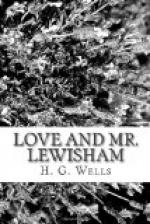He was quite sure that he had failed in this last examination. He knew that any career as a scientific man was now closed to him for ever. And he remembered now how he had come along this very road to that great building for the first time in his life, and all the hopes and resolves that had swelled within him as he had drawn near. That dream of incessant unswerving work! Where might he have reached if only he had had singleness of purpose to realise that purpose?...
And in these gardens it was that he and Smithers and Parkson had sat on a seat hard by the fossil tree, and discoursed of Socialism together before the great paper was read....
“Yes,” he said, speaking aloud to himself; “yes—that’s all over too. Everything’s over.”
Presently the corner of the Natural History Museum came between him and his receding Alma Mater. He sighed and turned his face towards the stuffy little rooms at Chelsea, and the still unconquered world.
CHAPTER XXVII.
CONCERNING A QUARREL.
It was late in September that this particular quarrel occurred. Almost all the roseate tints seemed gone by this time, for the Lewishams had been married six months. Their financial affairs had changed from the catastrophic to the sordid; Lewisham had found work. An army crammer named Captain Vigours wanted someone energetic for his mathematical duffers and to teach geometrical drawing and what he was pleased to call “Sandhurst Science.” He paid no less than two shillings an hour for his uncertain demands on Lewisham’s time. Moreover, there was a class in lower mathematics beginning at Walham Green where Lewisham was to show his quality. Fifty shillings a week or more seemed credible—more might be hoped for. It was now merely a case of tiding over the interval until Vigours paid. And meanwhile the freshness of Ethel’s blouses departed, and Lewisham refrained from the repair of his boot which had cracked across the toe.
The beginning of the quarrel was trivial enough. But by the end they got to generalities. Lewisham had begun the day in a bad temper and under the cloud of an overnight passage of arms—and a little incident that had nothing to do with their ostensible difference lent it a warmth of emotion quite beyond its merits. As he emerged through the folding doors he saw a letter lying among the sketchily laid breakfast things, and Ethel’s attitude suggested the recoil of a quick movement; the letter suddenly dropped. Her eyes met his and she flushed. He sat down and took the letter—a trifle awkwardly perhaps. It was from Miss Heydinger. He hesitated with it halfway to his pocket, then decided to open it. It displayed an ample amount of reading, and he read. On the whole he thought it rather a dull sort of letter, but he did not allow this to appear. When it was read he put it carefully in his pocket.
That formally had nothing to do with the quarrel. The breakfast was already over when the quarrel began. Lewisham’s morning was vacant, and be proposed to occupy it in the revision of certain notes bearing upon “Sandhurst Science.” Unhappily the search for his note-book brought him into collision with the accumulation of Ethel’s novelettes.




